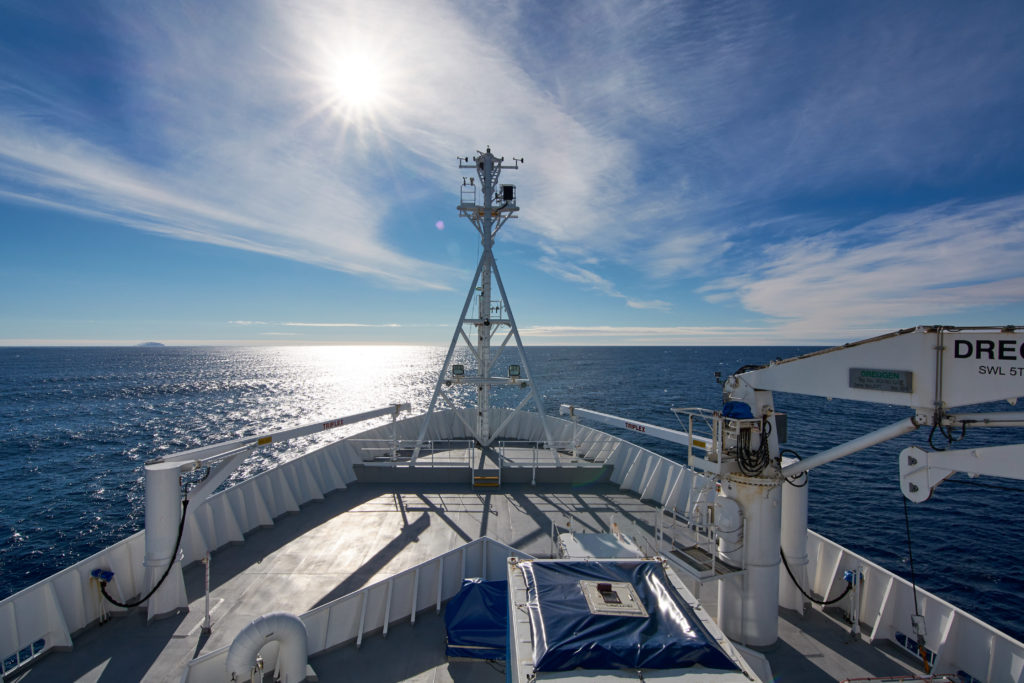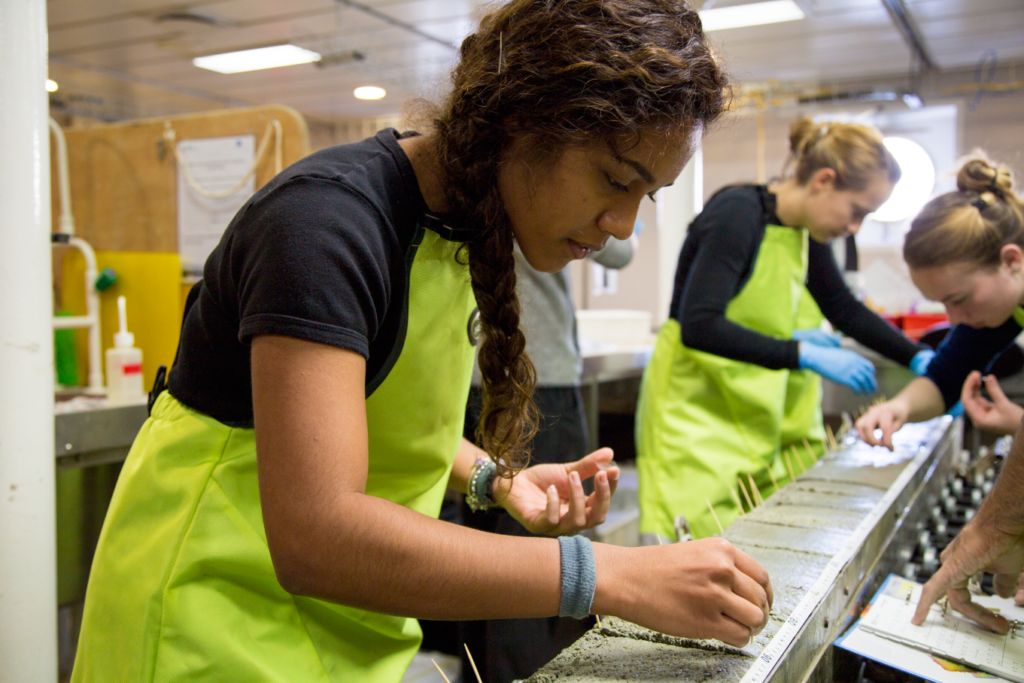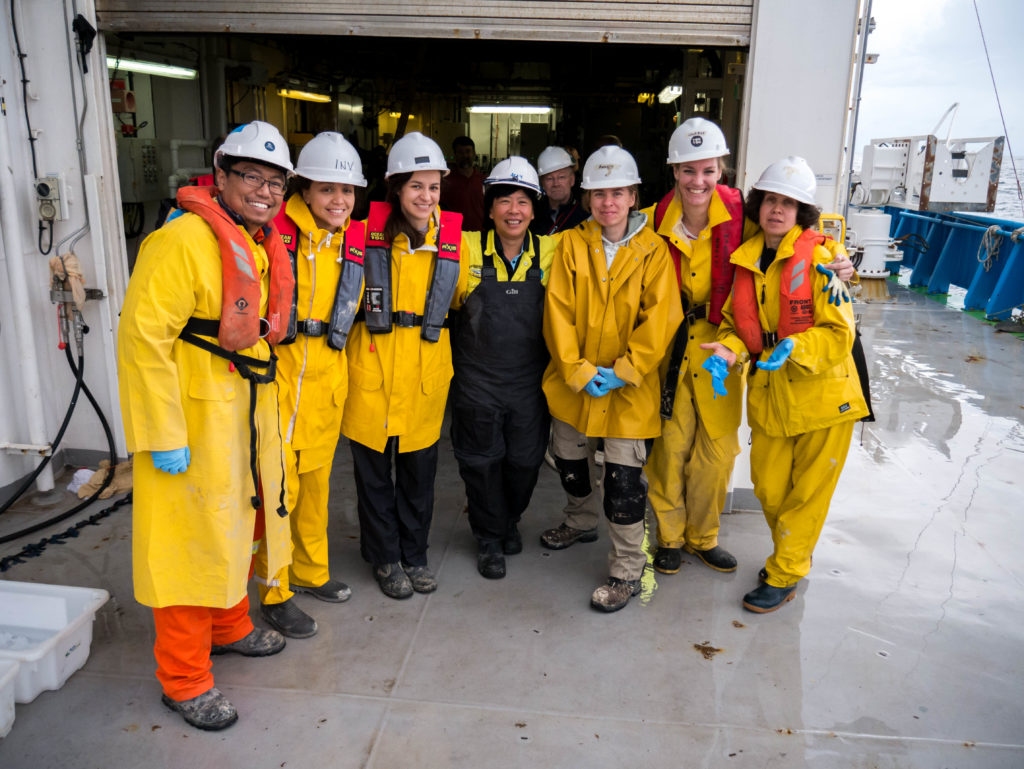
Ship bow with foremast and open ocean ahead.
CAPSTAN offers Australia new horizons for marine science education and training on board research vessel Investigator. Image Diego Cotterle, Italian National Antarctic Research Program.
By 2025, Australia’s oceans are expected to contribute $100 billion a year to the national economy. A breakthrough Australian sea training program seeks to help provide the marine scientists who will be central to the future security and prosperity of this growing Blue Economy.
Called CAPSTAN (Collaborative Australian Postgraduate Sea Training Alliance Network), this new program is similar to its nautical namesake in seeking to apply a positive force to move something forward, in this case advancing marine science training to better suit the growing needs of our nation.
Australia lacks a national approach to graduate marine science training, and much of the current training is weighted towards specific disciplines that may not always match the future needs of industry and government. CAPSTAN aims to fill that gap, and pool national tertiary teaching expertise and resources in the delivery of a multidisciplinary, research-based teaching program on board our advanced research vessel Investigator. The program also aims to enhance collaboration and cooperation in the marine sciences by establishing a national network of next-gen marine scientists.
Managed by Macquarie University, CAPSTAN represents a collaboration in approach between a network of leading industry and university partners, supported by a commitment of sea time on Investigator from the Marine National Facility (MNF).
CAPSTAN begins on Tuesday, 14 November when 29 postgraduate students and trainers set sail from Henderson (near Fremantle), Western Australia on board Investigator. Students on this inaugural voyage will receive two valuable weeks of hands-on training with a wide range of contemporary scientific equipment used in marine research, encompassing geological, biological, oceanographic and atmospheric science.

Three female researchers placing toothpicks into long tray of seafloor mud.
Investigator makes possible a wide range of research, education and training, providing many young scientists with formative experiences working in the marine environment.
Equally as diverse as the training on offer will be the participating students and trainers.
Twelve universities from across Australia will be represented on the inaugural voyage, and female students will outnumber their male counterparts 2:1. The diversity in knowledge and experience of both trainers and students will provide fertile waters for the exchange of ideas and discussion, hopefully leading to the development of relationships to support future research and collaboration.
After departing Henderson, Investigator will sail to the far western Great Australian Bight to a study area near the deep Bremer Canyon, a submarine canyon known as a biodiversity hotspot for marine megafauna. While underway, data will be collected in transects across the Leeuwin Current and the Subtropical Front, and bird and marine megafauna observations will be recorded. While this is a training voyage, Investigator is continually collecting valuable data that contributes towards greater understanding of the marine environment.
During the voyage, students will gain experience with a wide range of equipment and instrumentation, including underway mapping systems, Conductivity-Temperature-Depth (CTD) equipment, seafloor corers, sleds, nets and drop cameras. They will also receive unique at sea training, including instruction in sea-survival skills.
CAPSTAN also integrates science engagement and communication training into the program, recognising the increasingly important role that scientists play in championing environmental awareness and facilitating knowledge transfer to industry, government and the greater community.

Seven people in yellow wet weather gear on back deck of ship.
Early career and experienced marine scientists are brought together on Investigator to share knowledge and collaborate in both research and training. Image Asher Flatt.
CAPSTAN has emerged out of a need for marine science training that is more quantitative, cross-disciplinary and in-line with industry and government needs. The program aims to help drive Australia’s growing Blue Economy by providing a platform for institutional, industrial and generational knowledge transfer and collaboration.
With our oceans changing at an alarming rate, it will likely be marine scientists from this and future CAPSTAN voyages that help us respond to the big challenges we face in protecting the marine environment, ensuring our food security and adapting to climate change.
The inaugural CAPSTAN voyage departs Henderson (Western Australia) on Tuesday, 14 November and arrives in Hobart (Tasmania) on Sunday, 26 November. The voyage is led by Chief Scientist, Assoc Prof Jochen Kaempf, from Flinders University, Co-Chief Scientist Assoc Prof Leah Moore, from University of Canberra, and CAPSTAN Director, Dr April Abbott, from Macquarie University.
CAPSTAN is one of a suite of STEM education and training programs made possible by the Marine National Facility that seek to inspire careers in STEM and help train future generations of marine scientists for Australia.


16th November 2017 at 4:32 pm
Good for them. As an Ex Master I hope for their sake the weather fine that area can be hostile.